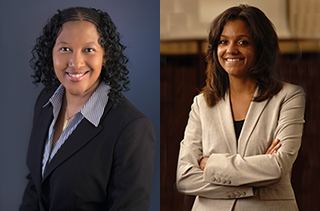At the Intersection of Gender, Sexuality and Race
Engaging. Timely. Relevant. Inspiring.
That’s how Mairead Carr describes last fall’s UAlbany - Albany Law School course “Race, Rape Culture and the Law,” which familiarizes students with the fundamentals of sexual harassment and assault laws and the ways in which they have affected the treatment of race, gender, identity and sexuality in the United States.
The course is the result of the combined efforts of Donna Young, the President William McKinley Distinguished Professor of Law and Public Policy at Albany Law, and Janell Hobson, professor and chair of Women’s Gender and Sexuality Studies (WGSS) at UAlbany. First offered in the fall, it is part of a five-year collaboration between the two institutions on a series of programs highlighting the intersection of law and pressing societal issues involving gender and race.
“I believe ‘Race, Rape Culture and the Law’ has helped me to develop a critical feminist lens,” said Carr, who is in the third year of UAlbany’s WGSS MA/Sociology PhD dual degree program. Most of her classmates were either WGSS master’s or JD students. UAlbany, in partnership with Albany Law, also offers a dual MA/JD in WGSS.
The course requires students to think within an intersectional framework to identify how interlocking systems of power affect those most marginalized in society. “My research is mainly framed from an intersectional perspective, a framework used in both the WGSS and Sociology departments,” said Carr. “But the WGSS department pushes me to integrate my research beyond sociology in a way that, I believe, makes it more impactful.”
 |
|
Co-instructors of “Race, Rape Culture and the Law” Janell Hobson, of UAlbany, at left, and Donna Young of Albany Law School. |
Hobson said that the course benefits from the compatibility of legal studies and women’s, gender and sexuality studies. “Both fields concern themselves with social problems and view social justice as the means by which to solve these issues,” she said.
“What I really liked about co-teaching with Professor Young is that we were in sync in relating across race, gender and the law, and our students from the different programs related in a similar way and learned from each other. It just shows the great potential of our dual degree program in which WGSS students can find an applicable approach to feminist theory while law students are able to learn theory alongside law.”
Carr said the students from different programs were able to value each other’s alternative approaches to addressing social problems, and added that, “in sharing an interest in interrogating social policies and the history behind rape culture, the course served as a reckoning regarding how we got the social environment we have today.”
She noted the concepts and issues discussed in the course will always be relevant, citing how this past fall the students looked at testimonies in the Senate Judiciary Hearings for now Supreme Court Justice Brett Kavanaugh and the growing influence of the #MeToo movement.
She also found the two instructors inspiring. “Drs. Hobson and Young (a visiting WGSS joint faculty member) put a lot of energy into our class discussions, and their expertise pushed students to think more deeply about the readings, comments we made in class, and the application of course concepts to the world more broadly. It’s rare to have an integrated learning environment where two professors lead the class from two different disciplines.
“I can think of no two people better able to create an integrative learning experience.”
She said that every one of the class’s students took “Race, Rape Culture and the Law” to gain something for either their own personal understanding or to advance their careers. “The construction of the course created one of the best learning environments that I have had the opportunity to be a part of in graduate school.”
Along with completing her PhD, Carr is developing the paper she wrote for the course to present at “Feminism is for Every(Body),” a conference organized through SIGH, the WGSS graduate student organization, and scheduled for Saturday, April 13, from 9 a.m. to 4 p.m. in Humanities 354.




